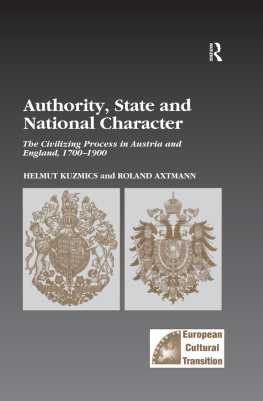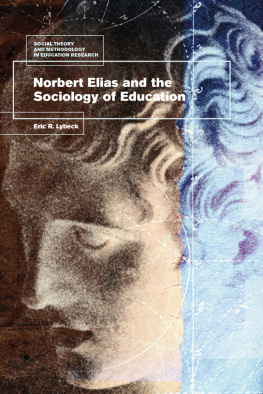AUTHORITY, STATE AND NATIONAL CHARACTER
Authority, State and National Character
The Civilizing Process in Austria and England, 17001900
Helmut Kuzmics
University of Graz, Austria
and
Roland Axtmann
University of Wales Swansea, UK
Studies in European Cultural Transition
Volume Thirty Six
General Editors: Martin Stannard and Greg Walker
First published 2007 by Ashgate Publishing
Published 2016 by Routledge
2 Park Square, Milton Park, Abingdon, Oxon OX14 4RN
711 Third Avenue, New York, NY 10017, USA
Routledge is an imprint of the Taylor & Francis Group, an informa business
Copyright Helmut Kuzmics and Roland Axtmann 2007
Helmut Kuzmics and Roland Axtmann have asserted their moral rights under the Copyright, Designs and Patents Act, 1988, to be identified as the authors of this work.
All rights reserved. No part of this book may be reprinted or reproduced or utilised in any form or by any electronic, mechanical, or other means, now known or hereafter invented, including photocopying and recording, or in any information storage or retrieval system, without permission in writing from the publishers.
Notice:
Product or corporate names may be trademarks or registered trademarks, and are used only for identification and explanation without intent to infringe.
British Library Cataloguing in Publication Data
Kuzmics, Helmut, 1949
Authority, state and national character: the civilizing process in Austria and England, 1700-1900.
(Studies in European cultural transition)
1.Authority 2.Power (Social sciences) 3.National characteristics, Austrian History 4.National
characteristics, English History 5.Austria History 18th century 6.Austria History 1789-1900
7.Great Britain History 18th century 8.Great Britain - History 19th century
I.Title II.Axtmann, Roland
303.36
Library of Congress Cataloging-in-Publication Data
Kuzmics, Helmut, 1949
[Autoritt, Staat und Nationalcharakter. English]
Authority, state and national character: the civilizing process in Austria and England, 1700-1900 / by
Helmut Kuzmics and Roland Axtmann.
p. cm. (Studies in European cultural transition)
Includes bibliographical references and index.
ISBN 0-7546-3560-0 (alk. paper)
1. Authority. 2. Power (Social sciences) 3. Literature and societyAustria. 4. Literature and
societyEngland. 5. National characteristics, AustrianHistory. 6. National characteristics, English
History. 7. AustriaCivilization17th century. 8. AustriaCivilization18th century. 9. England
Civilization17th century. 10. EnglandCivilization18th century. I. Axtmann, Roland. II. Title. III.
Series.
HM1251.K8913 2000
303.36dc22
2006006946
The authors would like to thank the Austrian Ministry of Education, Science and Culture; the Province of Styria, Department for Science and Research; and the University of Graz/Austria for supporting the translation of this book.
First published in German as: Helmut Kuzmics/Roland Axtmann, Autoritt, Staat und Nationalcharakter. Der Zivilisationsproze in sterreich und England 1700 1900 . Leske + Budrich: Opladen 2000.
Bruce Allen and Alex Skinner provided excellent translation services.
ISBN 13: 978-0-7546-3560-4 (hbk)
Contents
The European dimension of research in the humanities has come into sharp focus over recent years, producing scholarship which ranges across disciplines and national boundaries. Until now there has been no major channel for such work. This series aims to provide one, and to unite the fields of cultural studies and traditional scholarship. It will publish the most exciting new writing in areas such as European history and literature, art history, archaeology, language and translation studies, political, cultural and gay studies, music, psychology, sociology and philosophy. The emphasis will be explicitly European and interdisciplinary, concentrating attention on the relativity of cultural perspectives, with a particular interest in issues of cultural transition.
Martin Stannard
Greg Walker
University of Leicester
Writing this book has been a lengthy and complicated journey that began in the early 1990s. It started with a grant of the Austrian Fonds zur Frderung der wissenschaftlichen Forschung enabling one of us, Helmut Kuzmics, to spend a year (199091) in Cambridge and thus, to start a project that should later turn into this book. Between 1990 and the publishing date of the German version of it, many years have passed, years, in which we received a great deal of help from a substantial number of helpful colleagues, through comments, extensive discussion or important hints: Karl Acham, Graz; Reinhard Blomert, Berlin; Leslie Bodi, Melbourne; Stephan Bhm, Graz; Rainer Czaputa, Graz; Eric Dunning, Leicester; Peter R. Gleichmann (), Hannover; Franz Hllinger, Graz; Gemot Lauffer, Graz; Jacques Le Rider, Paris; Gerald Mozeti, Graz; Maggie O'Neill, Staffordshire; Gregor Pozniak, Vienna; Heiner Rutte, Graz; Ralph Schroeder, Oxford; Michael Schrter, Berlin; Steve Sharot, Bersheba; Annette Treibel, Bochum/Karlsruhe; Efrat Tselon, Leeds/Dublin; Richard Wall, Cambridge; Cas Wouters, Utrecht; Jrg Zilian (), Graz. Gerald Mozeti, Heiner Rutte and Jrg Zilian () read various drafts of this book and helped to eliminate errors of all kind. We are also grateful for the ideas and contributions of some excellent students in graduate courses at the University of Graz Barbara Hnig, Ruth Kmmel and Dieter Reicher. The lengthy and certainly very demanding task of translating an enormously tricky German text was more than satisfactorily performed by Bruce Allen, Heidelberg (-3, 79). The translation was only made possible by the financial assistance of the Austrian Ministry for Education, Science and Culture, the Government of the Province of Styria, and the University of Graz. We wish to thank them all. During the time-consuming process of translation, we have also received invaluable help from Eric Dunning, Leicester; Jonathan Fletcher, Singapore; Steven Loyal and Steven Quilley, both Dublin, and Brigitte Steingruber, Graz. Many thanks! Regina Fritzsche assisted in preparing the Index. Particular mention, finally, deserves Gertrude Selbitschka, who wrote and formatted the final version of this book. Without her skill and patience this book would not have been published.
Graz, Swansea
December 2006
Chapter
Introduction
A number of films well evoke the spirit and existential certainties of the departed British Empire and its even more utterly vanished pendant, the Habsburg Monarchy. There is, for example, Chariots of Fire (1981), an epic film of now iconic stature, which follows the making of British athletes through to Olympic triumph in the middle-distance track events. A numinous 'Englishness' that fairly evades the sociologist's net shines through this saga of enterprise and fair play, of altercations with college authorities set against the spirit of commercialization, down to the final sporting breakthrough, as sensational as it is hard-won. Just such a tussle between university authorities and headstrong students, waged sotto voce but no less boisterously for all that, marked also by elements of great mutual respect and enacted in scenes of subtly deployed bodily language against the backdrop of an instantly recognizable college landscape, strikes the Continental observer as 'typically English', though she might be unable to say exactly why this is so. Altogether different is the impression made by grumpy privy councillors and fetching chamber maids (equally familiar fare to Austrian cinema-goers) in films starring the 'people's actor' himself, Hans Moser: somehow we know stories like this could never have happened in London or Cambridge. But how do we know? What is it that makes these slightly absurd portrayals of moaning subalterns, ready to burst into song at the drop of a hat, so unmistakeably and so utterly Austrian? In this book we assume that such sociologically vexed questions will yield only, if at all, to a multi-layered analysis of authority and co-incident patterns of psychic sedimentation.










